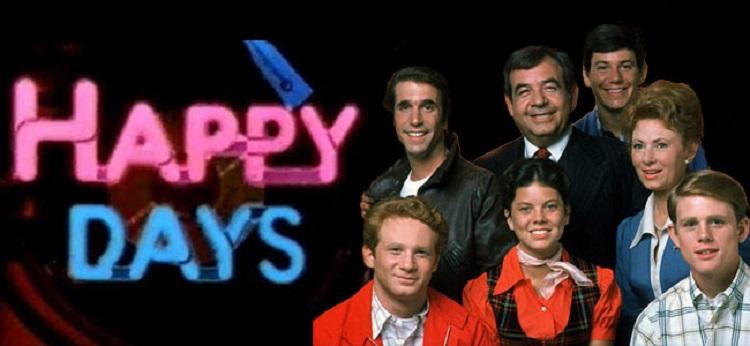The popular show that ran from 1974 to 1984 became a television classic and lives in the world of syndication, much to the delight of many fans of television spanning a wide range of ages. Today the show’s following resembles a powerful hybrid of pop-culture aficionados, true classic television fans, original cult following fans, fans of Ron Howard, and fans of Henry Winkler. I have to imagine that the sales of Happy Days merchandise went up significantly as Ron Howard became a super director, and even more so after Henry Winkler graced the silver screen as the shy coach with an eye for talented water boys in….Waterboy. Then, of course, both teamed up in the cult-popular Arrested Development, with Winkler as a bumbling lawyer drawn to seedy underworlds, and Ron Howard as the expertly toned narrating voice guiding the show’s chaos.
Again, I’m certain sales of merchandise, DVD’s, and syndication rights experienced an uphill spike due to a fascination for these performers and what they were like back in the day on Happy Days. The problem is, it seems many of the other actors believe CBS and Paramount failed to pay them for these surges in popularity over the years.
Actors Anson Williams, Marion Ross, Don Most, Erin Moran, and Tom Bosley’s wife Patricia Bosley brought a suit to the Los Angeles Superior Court. The seen-happier-days-actors claimed at least $10 million in damages with interest for not being paid properly for home video releases and licensed merchandise that used their images and voices. It’s important to note that the ones mostly responsible for the show’s continued popularity – Ron Howard and Henry Winkler – are not involved in the rather scathing and expensive suit against CBS, and Paramount’s former involvement. Paramount originally produced the show before CBS took it over after a corporate split in 2005.
In a somewhat unexpected turn, the representative of CBS consumer products agreed that the actors were in fact owed money, but also said they’ve been “working” with them for a “long time” on this issue. That last part is interesting because it suggests they’ve been trying to resolve this issue in the past, and have been unsuccessful. This fact could play an interesting role in the case if the judge finds out that some of the cast members have failed to cooperate with CBS in the past. If you ask me, I’m sure the actors are owed money, but I’d question the $10 million dollars. This is very important because if they do get their $10 million and the rest of their requests, it will set a precedent for this kind of case. I guarantee you if the Happy Days cast gets their money, the Los Angeles Superior Court will turn into a living classic television museum and rerun star convention, with a revolving door of has been actors from once popular shows requesting their own reparations.

